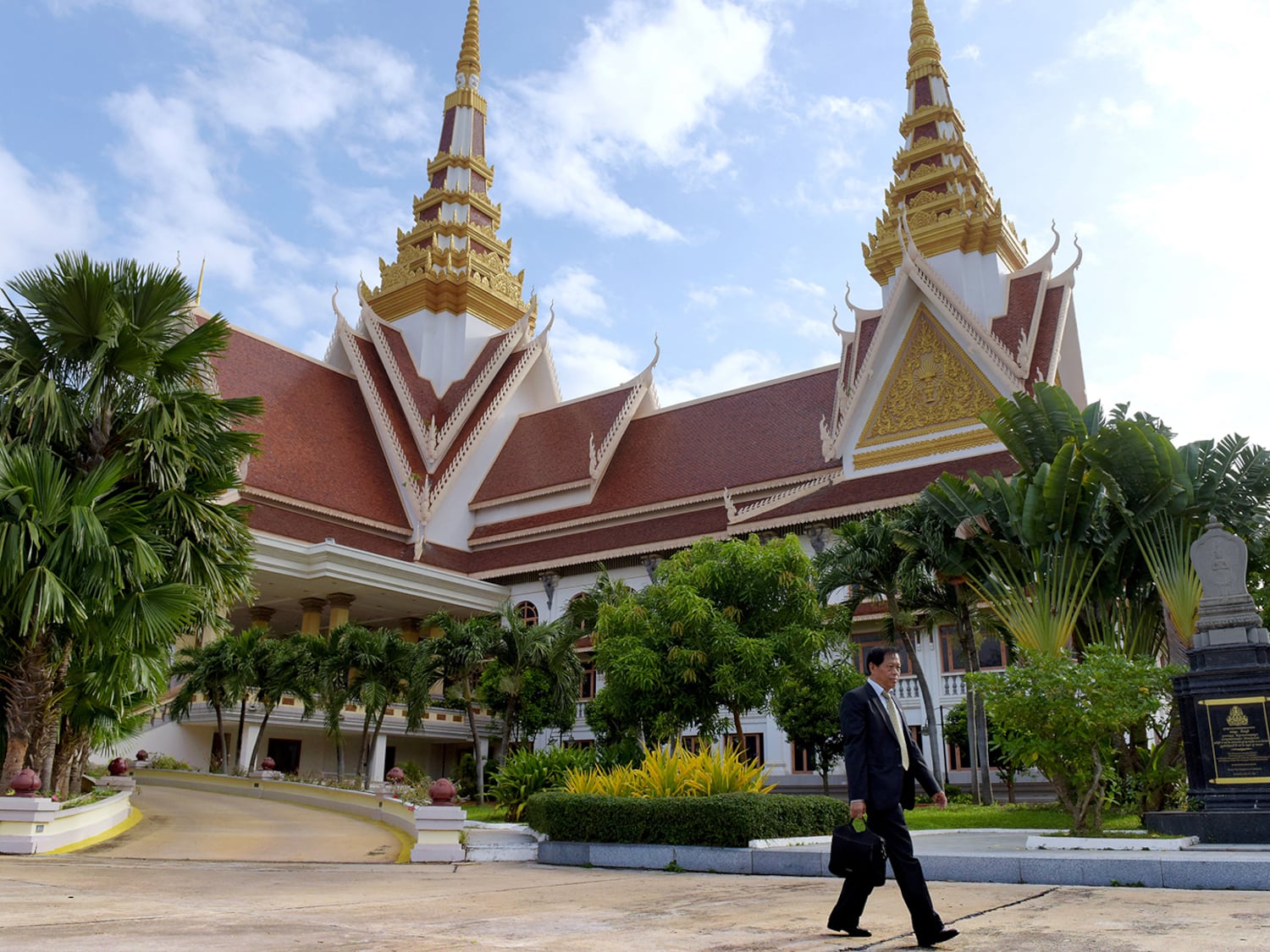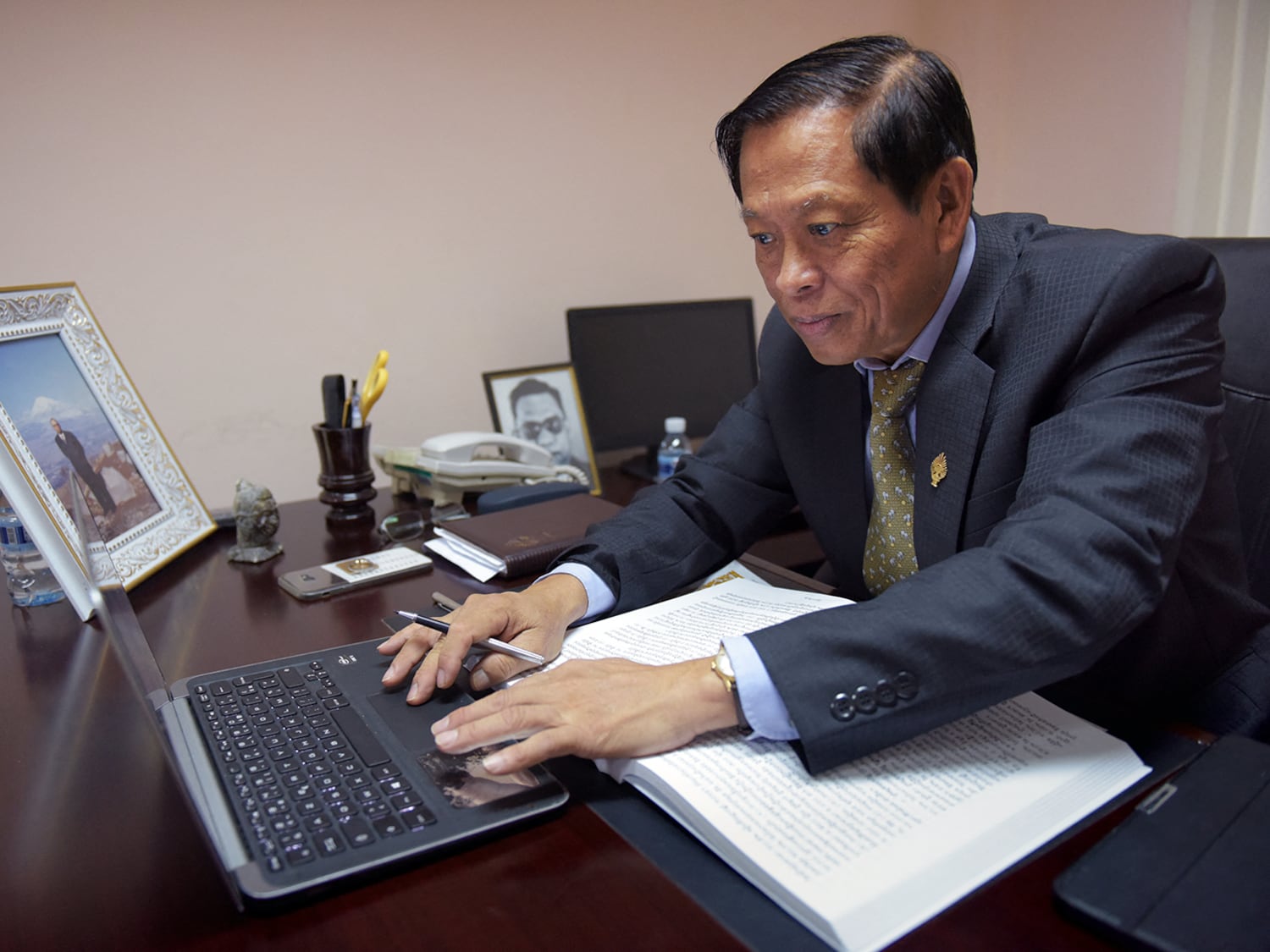A former opposition party lawmaker was fatally shot just after arriving in Bangkok from Cambodia’s Siem Reap province, apparently by an assassin who fired at him as street vendors and others stood nearby, then casually rode off on a motorbike.
Surveillance video footage posted to Facebook showed a tall man remove his helmet just before strolling across a busy street near Wat Bowonniwet Vihara temple in Bangkok’s Phra Nakhon district.
Three shots could be heard on the video, although the actual shooting was not visible. Then the man, wearing long jeans and a grey short-sleeved shirt with a bag across the front, jogs back to his parked motorbike and rides away, steering with one hand while adjusting his helmet.
The Bangkok Post reported that Lim Kimya, 74, was shot twice at around 4 p.m. and died at the scene. He had traveled by bus with his French wife and Cambodian uncle, police told the newspaper.
Police said they’ve launched a manhunt for the shooter. Thailand’s Khaosod newspaper posted two surveillance images of the suspect riding a motorbike at around the time of the shooting.
The shooting will have a “direct impact” in further intimidating hundreds of Cambodian political opposition figures, activists and human rights defenders who have fled to Thailand to escape political repression in Cambodia, said Phil Robertson, the director of Asia Human Rights and Labour Advocates.
“This brazen shooting … on the streets of Bangkok has all the hallmarks of a political assassination, and looks to be a significant escalation in the use of transnational repression in Bangkok,” he said in a statement.
Lim Kimya told Agence France-Presse in 2017 that he would “never give up politics” and planned to stay in Cambodia despite an order from the Supreme Court banning the opposition Cambodia National Rescue Party, or CNRP.

The CNRP was founded by veteran opposition leader Sam Rainsy in 2012. It was banned by the court following accusations that it had plotted to topple the government. Many of its top leaders – including Sam Rainsy – left the country after the ruling.
“With dual French-Cambodian citizenship, Lim Kimya could have easily joined the three dozen MPs who have fled abroad,” AFP wrote in 2017. “Yet Lim Kimya refuses to quit.”
Proposal for ‘terrorist’ designation
Tuesday’s shooting came as former Prime Minister Hun Sen urged the government to pass a law allowing prosecutors to charge dissidents with terrorism.
“It is time to make a law that will define any person or group that has plans or actions to create an anti-extremist movement, cause chaos and insecurity in society, cause conflict with others, and attempt to overthrow the government as terrorists who must be brought to justice to protect peace,” he said at a public ceremony.
With no real opposition, the ruling Cambodian People’s Party, or CPP, coasted to national election victories in 2018 and 2023.
After 38 years in power, Hun Sen resigned as prime minister just after the 2023 election to make way for the appointment of his son, Hun Manet, who has since shown little interest in diverting from his father’s heavy-handed approach to ruling Cambodia.
Hun Sen continues to serve as president of the CPP and as Senate president.

Tuesday’s ceremony marked the 46th anniversary of the day that the Khmer Rouge regime was driven from power by a Vietnamese-led force. The event is celebrated annually by the CPP, which has historic ties to Vietnam and came to power after the Khmer Rouge was forced out of Phnom Penh.
In recent years, dozens of pro-democracy Cambodian activists have fled to Thailand to seek asylum as the CPP has used intimidation and the courts to neutralize the political opposition.
Several Cambodians have said they were attacked in public in Thailand in 2023 because of their activism.
Smash and destroy
Last February, Prime Minister Hun Manet met with then-Thai Prime Minister Srettha Thavisin in Bangkok to discuss a crackdown on what they called “interference” in Cambodian politics by Thai-based Cambodian political activists.
In June, Hun Sen encouraged CPP supporters to “smash” and “destroy” opposition political activists in audio comments that were purportedly recorded at a party meeting and circulated on Cambodian social media.
In November, six activists associated with the CNRP and one minor were deported from Thailand to Cambodia at the request of the Cambodian government. The six adults, who escaped Cambodia in 2022, were subsequently charged with “treason.”
Cambodian activists remaining in Thailand told RFA in November that the arrests have increased their safety concerns, with one dissident saying that nearly 100 Cambodian refugees had fled their rented rooms for new housing and agreed to stop meeting up in-person.
RELATED STORIES
Cambodia charges 6 activists deported from Thailand with treason
Cambodian opposition activist flees to US amid Hun Sen threats
Government mum about Hun Sen audio calling for opposition to be ‘smashed’
Silent struggles plague Cambodian refugees in Bangkok
Robertson urged Thai authorities to conduct a thorough and transparent investigation, adding that the French government should also “aggressively pursue justice” for Lim Kimya – “no matter where the path leads.”
“Thailand’s international reputation is on the line in this case, and the Thai police and politicians should recognize they can’t just sweep this brutal murder under the rug,” he said.
International human rights groups have condemned Thailand for assisting neighbors, including Vietnam and Cambodia, to undertake what the groups say is unlawful action against human rights defenders and dissidents, making Thailand increasingly unsafe for those fleeing persecution.
Human Rights Watch has criticized what it called a “swap mart” of transnational repression in which foreign dissidents in Thailand are effectively traded for critics of the Thai government living abroad.
Translated by Yun Samean. Edited by Matt Reed and Malcolm Foster.
This content originally appeared on Radio Free Asia and was authored by RFA Khmer.
This post was originally published on Radio Free.